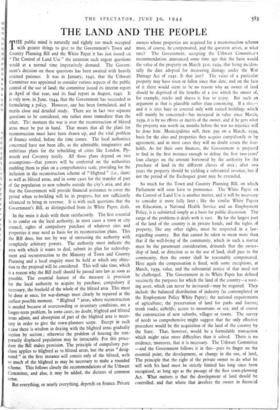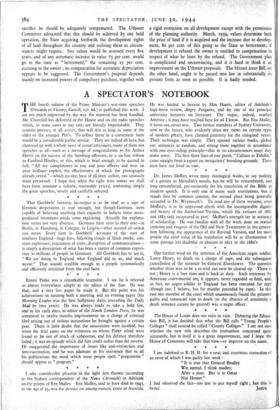THE LAND AND THE PEOPLE
rIIHE public mind is naturally and rightly too much occupied .1 with greater things to give to the Government's Town and Country Planning Bill and the White Paper it has just issued cn " The Control of Land Use " the attention such urgent questions would at a normal time imperatively demand. The Govern- ment's decision on these questions has been awaited with heavily strained patience. It was in January, 1941, that the Uthwatt Committee was appointed to consider various aspects of the public control of the use of land; the committee issued its interim report in April of that year, and its final report in August, 1942. It is only now, in June, 1944, that the Government has succeeded in formulating a policy. However, one has been formulated, and it merits close and detailed study. There are in fact two separate questions to be considered, one rather more immediate than the other. The moment the war is over the reconstruction of blitzed areas must be put in hand. That means that all the plank for reconstruction must have been drawn up, and the vital problem of finance settled, before the time comes. The local authorities concerned have not been idle, as the admirable, imaginative and ambitious plans for the rebuilding of cities like London, Ply- mouth and Coventry testify. All those plans depend on two assumptions—that powers will be conferred on the authorities enabling them to plan on a comprehensive scale, providing for the inclusion in the reconstruction scheme of " blighted " (i.e., slum) as well as blitzed areas, and in some cases for the transfer of part of the population to new suburbs outside the city's area, and also that the Government will provide financial assistance to cover the period when re-building will be in progress, but not sufficiently advanced to bring in revenue. It is with such questions that the Government's Bill, as distinguished from its White Paper, deals.
In the main it deals with them satisfactorily. The first essential is to confer on the local authority, in most cases a town or city council, rights of compulsory purchase of whatever sites and properties it may need as basis for its reconstruction plans. This the Bill does, but not by way of entrusting the authority with completely arbitrary powers. The authority must indicate the area with which it wants to deal, submit its plan for redevelop- ment and reconstruction to the Ministry of Town and Country Planning and a local enquiry must be held at which any objec- tion to the proposal will be considered. This will take time, which is a reason why the Bill itself should be passed into law as soon as possible. The essential feature of the measure is provision for the local authority to acquire by purchase, compulsory if necessary, the freehold of the whole of the blitzed area. This must be done at once, for war-damage must clearly be repaired at the earliest possible moment. " Blighted " areas, where reconstruction is needed because of overcrowding or insanitary conditions, are a longer-term problem. In some cases, no doubt, blighted and blitzed areas adjoin, and absorption of part of the blighted area is neces- sary in order to give the town-planners scope. Except in such a case there is wisdom in dewing with the blighted areas gradually section by section ; otherwise the problem of housing the tem- porarily displaced population may be intractable. For this proce- dure the Bill makes provision. The principle of compulsory pur- chase applies to blighted as to blitzed areas, but the areas " desig- nated " in the first instance will consist only of the blitzed, with so much of the blighted as may be necessary to make a rounded scheme. This follows closely the recommendations of the Uthwatt Committee, and also, it may be added, the dictates of common sense.
But everything, or nearly everything, depends on finance. Private owners whose properties are acquired for a reconstruction scheme must, of course, be compensated, and the question arises, at what rate? The Government, accepting the Uthwatt Committee's recommendation, announced some time ago that the basis would the value of the property on March 31st, 1939, that being inciden- tally the date adopted for measuring damage under the War Damage Act of 1941. It that just? The value of a particular property may have risen or fallen since that date, and on the face of it there would seem to be no reason why an owner of land should be deprived of the benefits of a rise which the owner of, for example, stocks and shares is free to enjoy. But such an argument as that is plausible rather than convincing. If a site,— and it is sites bare or covered only with ruined buildings which will mainly be concerned—has increased in value since March, 1939, it is by no efforts or merits of the owner, and if he gets what the property was worth six months before the war no injustice will be done him. Municipalities will, then. pay on a March, 1939, basis for the sites and properties they acquire compulsorily or by agreement, and in most cases they will no doubt retain the free- holds. As for their own finances, the Government is prepared to find in the first instance enough to defray the first two-years' loan charges on the amount borrowed by the authority for the purchase of land in the different classes of area ; after two years the property should be yielding a substantial revenue, but if not the period of the Exchequer grant may be extended.
So much for the Town and Country Planning Bill, on which Parliament will soon have to pronounce. The White Paper on the Control of Land Use is another matter, and it will be necessary to consider it more fully later ; like the similar White Papers on Education, a National Health Service and an Employment Policy, it is submitted simply as a basis for public discussion. The range of the problems it deals with is vast. By far the largest part of the land of the country is in private hands, and the rights of property, like any other rights, must be respected in a law- regarding country. But that cannot be taken to mean more than that if the well-being of the community, which in such a matter must be the paramount consideration, demands that the owner- ship of land, or direction as to the use of land, shall pass to the community, then the owner shall be reasonably compensated. Here again the compensation is fixed, with some exceptions, at March, 1939, value, and the substantial justice of that need not be challenged. The Government in its White Paper has defined succinctly the purposes for which the land of the country—a wast- ing asset, which can never be increased—may be required. They include the balanced distribution of industry Jas contemplated in the Employment Policy White Paper); the national requirements of agriculture; the preservation of land for parks and forests; trunk roads; airfields; access to mountains or sea; and of course the construction of new suburbs, villages or towns. The survey of needs so comprehensive might suggest that the only effective procedure would be the acquisition of the land of the country by the State. That, however, would be a formidable transaction which might raise more difficulties than it solved. There is no evidence, moreover, that it is necessary. The Uthwatt Committee —and the Government follows it in this—puts its finger on the essential point, the development, or change in the use, of land, The principle that the right of the private owner to do what he will with his land must be strictly limited has long since been recognised, as long ago as the passage of the first town-planning Act. What matters is that the development of land should be controlled, and that where that involves the owner in financial sacrifice he should be adequately compensated. The Uthwatt Committee advocated that this should be achieved by one bold operation, the State acquiring forthwith the development rights of all land throughout the country and utilising them as circum- stances might require. Site values would be assessed every five years, and of any automatic increase in value 75 per cent. would go to the state as " betterment," the remaining 25 per cent. accruing to the owner ; no compensation for automatic depreciation appears to be suggested. The Government's proposal depends mainly on increased powers of compulsory purchase, together with a rigid restriction on all development except with the permission of the planning authority. March, 1939, values determine both the price of land if it is acquired and the increase due to develop- ment, 8o per cent. of this going to the State as betterment; if development is refused the owner is entitled to compensation in respect of what he loses by the refund. The Government plan is complicated and unconvincing, and it is hard to think it an improvement on the Uthwatt proposals. The blitzed areas Bill, on the other hand, ought to be passed into law in substantially its present form as soon as possible. It is badly needed.































 Previous page
Previous page